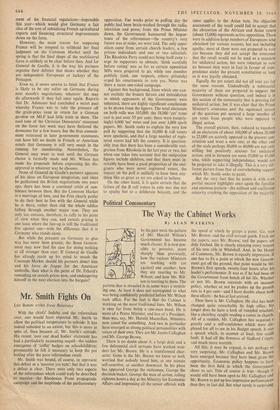Mr. Smith Fights On
LEO BARON writes from Bulawayo
With the chiefs' Lndaba and the referendum over, one would have expected Mr. Smith to allow the political temperature to subside. It has indeed subsided to an extent, but this is more in spite of, than because of, Mr. Smith's attitude. His recent `over our dead bodies' statement has had a particularly nauseating sequel—the sudden emergence of 'coffin' badges on schoolchildren; presumably he felt it necessary to keep the pot boiling after the poor referendum result.
Mr. Smith was bound, of course, to represent this defeat as a `massive yes vote'; but that it was a defeat is clear. There were only two aspects of the referendum which could truly be described as massive—the Rhodesian Front propaganda campaign and the ineptitude of the parliamentary opposition. For weeks prior to polling day the public had been brain-washed through the radio, television and press; from the Prime Minister down, the Government hammered the impor- tance of the referendum—the country's very future was at stake, we were told. The only oppo- sition came from certain church leaders, a few private individuals and one or two editorials. The Rhodesia Party could not bring itself even to urge its supporters to abstain; `think carefully before voting' was as far as certain opposition MPs were prepared to go, while one member publicly (and, one suspects, others privately) urged his constituents to vote yes. Never was there a more one-sided campaign.
Against this background, from which one can- not exclude the brazen threats and intimidation to which opponents of the Government were subjected, there are highly significant conclusions to be drawn from the figures. The total electorate on both rolls was 105,000; the 58,000 `yes' votes cast is just over 55 per cent; there were (surpris- ingly) 6,000 'no' votes and just over 1,000 spoilt papers. Mr. Smith seeks to explain the very low poll by suggesting that the 10,000 B roll voters were apathetic, and that a large number of regis- tered voters had left the country. It is question- ably true that there has been a considerable emi- gration from Rhodesia in the last'year or two, but when one takes into account that the emigration figures include children, and that there must in- evitably have been a good proportion of the emi- grants who were never registered voters, the impact on the poll is unlikely to have been any- thing like as great as we are asked to believe.
On the other hand, it is quite certain that the failure of the B roll voters to vote was due not to apathy but to a deliberate boycott, and the same applies to the Asian vote. No objective assessment of the result could fail to accept that the abstention of the African and Asian voters (about 15,000) represents active opposition. There were in addition large numbers of Europeans who abstained for various reasons, but not including apathy; most of them were not prepared to vote yes because they did not accept the assurance that the result would not be used as a mandate for unilateral action, but were reluctant to vote no because they were in fact in favour of inde- pendence under the present constitution so long as it was legally obtained.
Equally the yes voters did not all vote yes for the same reasons. Undoubtedly a substantial majority of them are prepared to support the Government without question, and indeed it is this section of the community that is pressing for unilateral action; but it was clear that the Prime Minister's assurance and the equivocal nature of the question put secured a large number of yes votes from people who were opposed to illegal action.
The overall picture, then, reduced to numbers of an electorate of about 100,000 of whom 20,000 to 25,000 are actively opposed to the present con- stitution and want a new one; at the other end of the scale perhaps 30,000 to 40,000 are not only willing but positively anxious for unilateral action; and in between are some 35,000 to 45,000 who, while supporting independence, would not be prepared to take it illegally. This is a very dif- ferent picture from that of overwhelming support which Mr. Smith seeks to paint. , But the very fact that he paints it with even partial success highlights once again the familiar and ominous pattern—the militant and vociferous minority crushing the opposition of the majority.


































 Previous page
Previous page